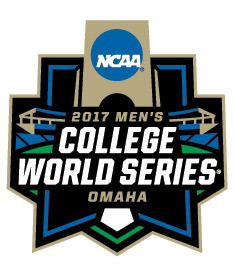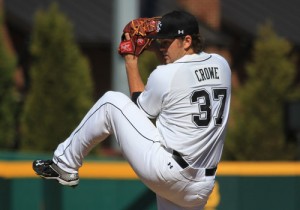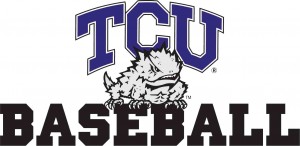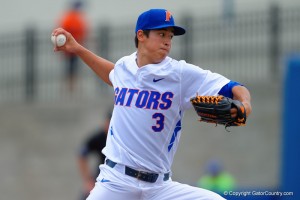Here’s a recap of our CWS coverage so far for 2017:
- College Baseball 2017 Kickoff
- Field of 64 announcement with Regional predictions and highlights of top-end draft prospects.
- 2017 Draft Preview with coverage of Local College-age eligible players of note (publishing closer to the draft)
- 2017 CWS tournament: Regional Results, Super-Regional Pairings
Lost in Draft 2017 mania was the finishing of the Super Regionals on Monday evening. This post is a couple days old but just in time for the CWS to start.
Super Regional Recaps: I’ve got these ordered by they way they’ll be playing into the CWS field (i.e. by bracket). And this is the order they’re listed on d1baseball’s Tourney Central, the quickest way to find results. Rain throughout southeast cancelled half the friday slate of games.
- #1 Oregon State vs Vanderbilt: Oregon State’s #1 starter Luke Heinrich left the team after some past indiscretions were uncovered by the local paper (you can google the details yourself; the timing of the unveiling couldn’t have come at a worse time for him, his team or his future just days ahead of the draft, however reprehensible his transgressions were). Behind #2 starter Jake Thompson they rolled over Vanderbilt nonetheless 8-4 in game one. They continued the onslaught, destroying one of the best SEC teams 9-2 to go two and out; Oregon State advances to the CWS even without its ace.
- Cal State Fullerton vs #9 Long Beach State: LBSU blanked CS-F in the first game 3-0, taking the 6th game out of the 7 times they’ve now played this season. Fullterton came roaring back and destroyed the Dirtbags 12-0 to force the decider. In a shocker to me, Cal-State Fullerton got a dominant pitching performance from a mid-week starter and won the clincher 2-1 to advance.
- Sam Houston State v #12 Florida State: FSU rallied to beat Sam Houston in the first game 7-6. Sam Houston was in control before FSU scored 3 in the 6th to tie it, eventually getting the walk-off in the bottom of the 9th. In game 2, Florida State scored in each of the first six innings to turn it into a laugher 19-0 and advance to their 22nd CWS.
- #4 LSU vs Mississippi State: LSU scored 4 in the 8th to rally past Mississippi State in the first. LSU’s ace Alex Lange was a bit wild; he got relieved by Virginia product Zach Hess, who got the Win. In Game 2, LSU turned a close game into a laugher as Mississippi State seemed to run out of arms, eventually winning 14-4 to advanced to the CWS.
- Davidson vs TAMU: Texas A&M beat the cinderella story Davidson 7-6 in the first game … in 15 innings (!). One worry you always have seeing these collegiate long extra inning games is pitcher abuse; TAMU did seem to select a periodic starter to eat up the extra innings, so that’s good to see. In Game 2, Davidson was ahead into the 8th … and then their lack of pitching depth finally got exposed. TAMU exploded for 10 runs in the 8th and 9th to blow them away 12-6 and be the second team to punch their ticket to the CWS.
- #7 Louisville v #10 Kentucky; Lousiville took game one behind their #2 starter, with super star Brendan McKay going 0-3 at the plate. McKay got the win in game two to punch Louisville’s ticket to the CWS, the first team to do so. (Louisville had clinched the super regional before the LSU regional had played an inning thanks to weather).
- #6 TCU v Missouri State: TCU won a close one 3-2 behind ace Jared Janczak; they scored 2 in the 8th to go ahead. TCU cruised in game 2 8-1 to advance to their 4th straight CWS.
- #3 Florida vs #14 Wake Forest: Florida won game 1 in 11 innings; they threw ace Alex Faedo but he was on 72 pitches through 4 and got pulled. Wake’s ace Parker Dunshee threw a fantastic game; 8ip, 3hits but Florida won on a walk-off. Game two was suspended sunday night due to rain; the last regional to finish. Wake Forest took the suspended game to force the decider, which unfortunately was being played just as the MLB draft started monday night. There, Florida held serve and advanced 3-0 to finish out the field.
My CWS Predictions: Oregon State, TAMU, Florida, LSU, Florida State, TCU, Louisville, Long Beach State.
Actuals: Oregon State, TAMU, Florida, LSU, Florida State, TCU, Louisville, Cal-State Fullerton
I got 7 of 8 right, missing on the Fullerton pick (figuring that Long Beach State would continue to dominate them).
CWS Field and Profiles
Top Bracket:
- #1 Oregon State: 54-4 overall record (27-3 in conference). 1st place Pac12, Regular season conference champ (no post-season Pac12 tourney)
- Cal State Fullerton: 39-22 (15-9). 3rd place Big West regular season (no Big West tourney)
- #12 Florida State 45-21 (14-14): 5th place, Atlantic division ACC regular season. 1st place ACC tournament.
- #4 LSU: 48-17 (21-9): 1st place, SEC West conference. SEC tourney champs.
Bottom Bracket
- Texas A&M: 41-21 (16-14): 5th place SEC West.
- #7 Louisville: 52-10 (23-6): 1st Place Atlantic division ACC regular season.
- #6 TCU: 47-16 (16-8): 1st place Big 12. Lost in Big12 tourney title game.
- #3 Florida: 46-19 (21-9): 1st Place SEC East regular season.
CWS field review by the numbers
- Pac12: 1 team
- Big West: 1 team
- ACC: 2 teams
- Big12: 1 team
- SEC: 3 teams
CWS Field thoughts
What a great CWS field. Several legendary programs (Cal-State Fullerton, Florida State and Florida) with dozens of appearances between them. The undisputed #1 team in the land (Oregon State). The undisputed #1 pre-season team in TCU. Arguably the hottest team in the land in LSU. The team with the likely #1 overall pick (Louisville). Great spread amongst the power conference; you have 1st place teams from both SEC divisions, the ACC, the Pac12 and the Big12. Every team in Omaha this year has been there already this decade, making it a very experienced field. Should make for great baseball.
Quick predictions: LSU from the top; I’ve always been slightly biased against Pac12 teams and when the #1 team from the west meets the #1 team from the powerhouse SEC conference, something tells me the Tigers will prevail. TCU from the bottom, though its tough to pick against Louisville. I think TCU gets a break not having to face Brendan McKay in game one and that might be the difference.
Final: TCU takes the title over LSU and fulfils their #1 pre-season ranking.
Player Star power in this CWS: By team, here’s the guys to look for either for Nats interest or for overall talent/draft position:
- Oregon State: two dominant starters in Luke Heimlich (possibly not playing) and Jake Thompson. Also Drew Rasmussen, drafted ahead of either guy. Max Engelbrekt has the best ERA on the team and was the Nats 40th round pick as a 5th-year senior.
- TAMU; RHP Corbin Martin
- Florida: Alex Faedo.
- LSU Alex Lange their #1 starter plus their clean-up hitter Greg Deichmann, both first day draft picks. Nats 2017 4th rounder Cole Freeman is their engine.
- Florida State; none really, despite FSU’s ranking. They’re a solid and younger team this year with no major 2017 draft prospects.
- TCU’s Evan Skoug might get drafted relatively highly.
- Louisville: led by #4 overall pick Brendan McKay.
- Cal State Fullerton; no 1st round notables; same as FSU: team depth, not superstars this year.
Nats 2017 Draftees in the CWS: thanks to the Nats strategy of drafting only College players, they drafted a ton of guys who are playing in Omaha. By team:
- Oregon State: Max Engelbrekt has the best ERA on the team and was the Nats 40th round pick as a 5th-year senior. Not sure why he lasted til the 40th round…
- TAMU: 5th rounder Jr RHP Brigham Hill, 18th rounder OF Nick Choruby.
- Florida: none
- LSU Nats 2017 4th rounder 2B Cole Freeman is their engine.
- Florida State: none
- TCU: none this year, last year’s pick Evan Skoug got picked.
- Louisville: none
- Cal State Fullerton: 24th rounder sr. SS Tim Richards
College CWS tournament references:
- d1baseball.com’s daily scoreboard is my go-to link
- d1baseball’s Tourney Central
- Baseball America’s College coverage home page
- CollegeBaseballDaily.com has coverage as well.
- CollegeBaseballCentral.com has coverage as well.
- Ncaa.com’s interactive full 64-team bracket for 2017
- NCAA Individual player stats
- Warren Nolan.com’s College Baseball RPI
- Warren Nolan’s Conference RPI rankings for 2017



